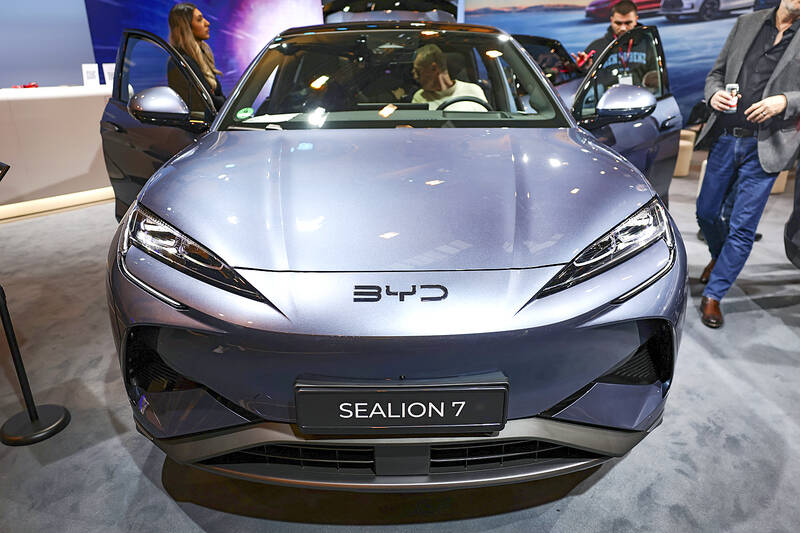China’s BYD Co (比亞迪) enjoyed a year-end surge to push total sales to 4.25 million passenger cars last year, narrowing its gap with Tesla Inc as the two vie for the crown of top-selling electric vehicle (EV) maker of the year.
The Shenzhen-based carmaker, which stopped making vehicles entirely powered by fossil fuels in 2022, hit a new monthly sales record last month, spurred on by subsidies and offering extra incentives to buyers.
BYD sold 509,440 plug-in hybrid and pure-electric passenger vehicles last month, the company said yesterday. The figure includes 207,734 EVs, taking the annual tally of battery-powered car sales to 1.76 million. Overall annual sales increased 41 percent year-on-year.

Photo: EPA-EFE
The rise of BYD as a best-selling car brand stands in contrast to the turmoil facing a growing number of legacy auto giants like Nissan Motor Co, Volkswagen AG and Stellantis NV. Western car brands have faced tumbling sales in China, while also lagging behind on the EV transition.
Tesla will unveil its fourth-quarter sales figures later this week. The Elon Musk-led company needs to deliver at least 515,000 EVs in the final three months of last year to meet its guidance for “slight growth” in annual sales, or 1.81 million deliveries, which would be a quarterly record for the company. Analyst estimates are for 510,400 deliveries, just shy of Tesla’s expectations.
By the third quarter, BYD had sold 1.16 million EVs, lagging Tesla by 124,100. However, the Chinese company has seen a last-quarter surge to narrow the gap with its US rival.
BYD’s surge will help cement its place among the top-selling carmakers globally. Its rise in total sales puts it near to beating Ford Motor Co and Honda Motor Co on an annual basis too. Higher sales will tip the company’s annual revenue over US$100 billion for the first time.
BYD’s gains have been fueled by domestic Chinese sales — and aided in the second half of the year by increased subsidies to convince drivers to ditch gasoline cars.
Its target to sell roughly half-a-million vehicles outside China has fallen short of expectations in the face of pushback from the European Union, which has imposed additional tariffs on Chinese EVs.
In Brazil, one of its biggest overseas markets, BYD is under scrutiny over allegations of slave-like conditions for some construction workers building a new EV factory.

UNCERTAINTY: Innolux activated a stringent supply chain management mechanism, as it did during the COVID-19 pandemic, to ensure optimal inventory levels for customers Flat-panel display makers AUO Corp (友達) and Innolux Corp (群創) yesterday said that about 12 to 20 percent of their display business is at risk of potential US tariffs and that they would relocate production or shipment destinations to mitigate the levies’ effects. US tariffs would have a direct impact of US$200 million on AUO’s revenue, company chairman Paul Peng (彭雙浪) told reporters on the sidelines of the Touch Taiwan trade show in Taipei yesterday. That would make up about 12 percent of the company’s overall revenue. To cope with the tariff uncertainty, AUO plans to allocate its production to manufacturing facilities in

Taiwan will prioritize the development of silicon photonics by taking advantage of its strength in the semiconductor industry to build another shield to protect the local economy, National Development Council (NDC) Minister Paul Liu (劉鏡清) said yesterday. Speaking at a meeting of the legislature’s Economics Committee, Liu said Taiwan already has the artificial intelligence (AI) industry as a shield, after the semiconductor industry, to safeguard the country, and is looking at new unique fields to build more economic shields. While Taiwan will further strengthen its existing shields, over the longer term, the country is determined to focus on such potential segments as

COLLABORATION: Given Taiwan’s key position in global supply chains, the US firm is discussing strategies with local partners and clients to deal with global uncertainties Advanced Micro Devices Inc (AMD) yesterday said it is meeting with local ecosystem partners, including Taiwan Semiconductor Manufacturing Co (TSMC, 台積電), to discuss strategies, including long-term manufacturing, to navigate uncertainties such as US tariffs, as Taiwan occupies an important position in global supply chains. AMD chief executive officer Lisa Su (蘇姿丰) told reporters that Taiwan is an important part of the chip designer’s ecosystem and she is discussing with partners and customers in Taiwan to forge strong collaborations on different areas during this critical period. AMD has just become the first artificial-intelligence (AI) server chip customer of TSMC to utilize its advanced

While China’s leaders use their economic and political might to fight US President Donald Trump’s trade war “to the end,” its army of social media soldiers are embarking on a more humorous campaign online. Trump’s tariff blitz has seen Washington and Beijing impose eye-watering duties on imports from the other, fanning a standoff between the economic superpowers that has sparked global recession fears and sent markets into a tailspin. Trump says his policy is a response to years of being “ripped off” by other countries and aims to bring manufacturing to the US, forcing companies to employ US workers. However, China’s online warriors